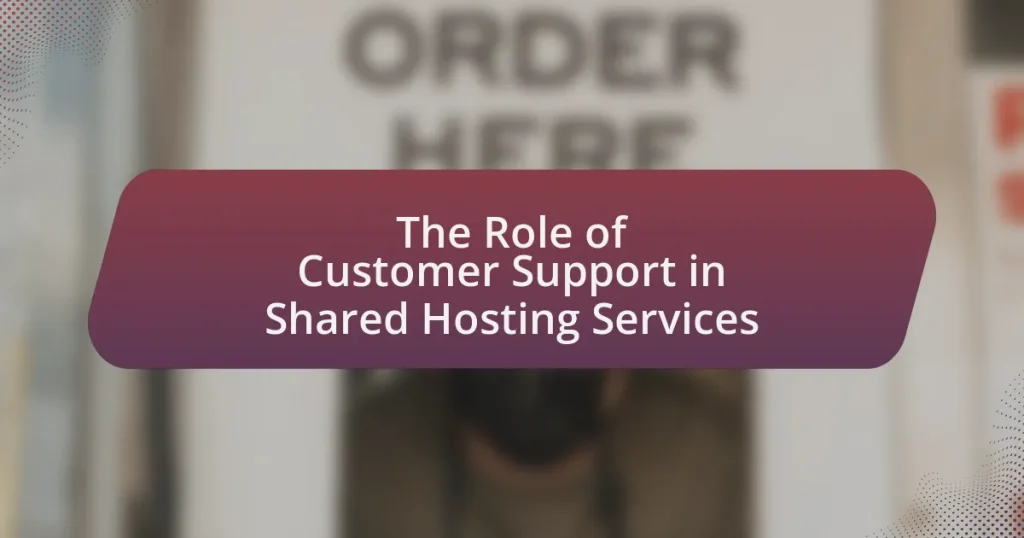Customer support plays a crucial role in shared hosting services by assisting users with technical issues, account management, and service inquiries, which are vital for maintaining customer satisfaction and retention. The article highlights the significant impact of responsive customer support on user experience, emphasizing that 70% of customers prioritize this factor when selecting a hosting provider. Key functions of customer support include providing technical assistance, resolving billing inquiries, and ensuring overall customer satisfaction. Additionally, the article discusses various support channels available, such as live chat, email, and phone support, and outlines best practices for both providers and users to enhance the effectiveness of customer support in addressing common challenges faced in shared hosting environments.
What is the Role of Customer Support in Shared Hosting Services?
Customer support in shared hosting services is essential for assisting users with technical issues, account management, and service inquiries. This support ensures that customers can effectively utilize the hosting services, addressing problems such as website downtime, server configuration, and billing questions. According to a survey by the HostingAdvice team, 70% of customers consider responsive customer support a critical factor when choosing a hosting provider. This highlights the importance of customer support in maintaining customer satisfaction and retention in the competitive shared hosting market.
How does customer support impact user experience in shared hosting?
Customer support significantly impacts user experience in shared hosting by providing timely assistance and resolving technical issues. Effective customer support enhances user satisfaction, as studies show that 70% of customers are willing to pay more for better service. Quick response times and knowledgeable support staff can reduce downtime and frustration, leading to a more positive perception of the hosting service. Additionally, user feedback indicates that responsive customer support is a key factor in retaining customers, with 90% of users stating that they would switch providers if support was inadequate.
What are the key functions of customer support in this context?
The key functions of customer support in shared hosting services include providing technical assistance, resolving customer inquiries, and ensuring customer satisfaction. Technical assistance involves helping users with setup, troubleshooting, and maintenance of their hosting services, which is crucial given that 70% of customers report needing help with technical issues. Resolving customer inquiries encompasses addressing billing questions, service upgrades, and account management, which are essential for maintaining clear communication and trust. Ensuring customer satisfaction is vital, as studies show that 90% of customers are likely to return to a service provider that offers excellent support, highlighting the importance of responsive and effective customer service in retaining clients.
How does effective customer support enhance customer satisfaction?
Effective customer support enhances customer satisfaction by providing timely and accurate assistance, which directly addresses customer needs and concerns. When customers receive prompt responses to their inquiries, it fosters a sense of reliability and trust in the service provider. Research indicates that 70% of customers are willing to spend more with companies that provide excellent customer service, highlighting the correlation between effective support and increased satisfaction levels. Furthermore, effective support can lead to quicker problem resolution, reducing frustration and improving the overall customer experience.
Why is customer support crucial for shared hosting providers?
Customer support is crucial for shared hosting providers because it directly impacts customer satisfaction and retention. Shared hosting environments often involve complex technical issues that can arise unexpectedly, and effective customer support ensures that users receive timely assistance to resolve these problems. According to a study by Zendesk, 82% of customers have stopped doing business with a company due to poor customer service, highlighting the importance of responsive support in maintaining a loyal customer base. Additionally, shared hosting providers typically cater to a diverse clientele, including individuals and small businesses with varying levels of technical expertise, making accessible and knowledgeable support essential for user success and overall service reliability.
What challenges do users face that customer support can address?
Users face several challenges that customer support can address, including technical issues, billing inquiries, and service outages. Technical issues often arise from software compatibility, server configuration, or website performance, which customer support can resolve through troubleshooting and guidance. Billing inquiries may involve questions about charges, payment methods, or account management, and customer support can clarify these concerns and assist with adjustments. Service outages, which can disrupt website accessibility, require prompt customer support intervention to diagnose the problem and provide updates on resolution efforts. These challenges highlight the essential role of customer support in ensuring user satisfaction and operational continuity in shared hosting services.
How does customer support influence customer retention in shared hosting?
Customer support significantly influences customer retention in shared hosting by providing timely assistance and resolving issues effectively. When customers encounter technical problems or have inquiries, responsive and knowledgeable support teams can enhance user satisfaction, leading to a higher likelihood of continued service usage. Research indicates that 70% of customers remain loyal to a brand due to positive customer service experiences. Additionally, effective support can reduce churn rates; for instance, companies with strong customer support report retention rates exceeding 90%. This demonstrates that quality customer support is a critical factor in maintaining customer loyalty in the shared hosting sector.
What types of customer support are available in shared hosting services?
Shared hosting services typically offer several types of customer support, including live chat, email support, phone support, and knowledge base resources. Live chat provides immediate assistance for urgent issues, while email support allows for detailed inquiries that may require more time to address. Phone support offers direct communication for complex problems, and a knowledge base serves as a self-help resource with articles and FAQs. These support options ensure that users can receive help in a manner that suits their needs, enhancing the overall customer experience in shared hosting environments.
What are the common channels for customer support in shared hosting?
Common channels for customer support in shared hosting include live chat, email support, phone support, and support tickets. Live chat offers real-time assistance, allowing customers to resolve issues quickly. Email support provides a way for customers to communicate detailed inquiries, while phone support allows for direct conversation with support representatives. Support tickets enable customers to submit issues that can be tracked and managed by the support team. These channels are essential for effective customer service in shared hosting environments, ensuring that users receive timely and efficient help.
How do live chat and email support compare in effectiveness?
Live chat support is generally more effective than email support for immediate customer inquiries. Research indicates that live chat can lead to a 73% customer satisfaction rate, while email support typically sees satisfaction rates around 61%. Additionally, live chat allows for real-time interaction, enabling quicker resolution of issues, which is crucial in shared hosting services where downtime can significantly impact users. A study by Forrester Research found that 44% of online consumers say that having their questions answered by a live person during an online purchase is one of the most important features a website can offer. This highlights the preference for instant communication over delayed responses typical of email support.
What role does phone support play in customer satisfaction?
Phone support plays a critical role in customer satisfaction by providing immediate assistance and personalized interaction. This direct communication channel allows customers to resolve issues quickly, leading to a more positive experience. Research indicates that 73% of customers prefer phone support for complex inquiries, as it offers clarity and reassurance that other channels may lack. Additionally, effective phone support can enhance customer loyalty, with studies showing that 70% of customers who receive satisfactory phone support are likely to recommend the service to others.
How do different hosting providers approach customer support?
Different hosting providers approach customer support through various channels and service levels. For instance, some providers offer 24/7 live chat and phone support, ensuring immediate assistance, while others may rely primarily on email support with longer response times. Additionally, many hosting companies implement ticketing systems to track and resolve issues efficiently, with some offering extensive knowledge bases and community forums for self-help. Research indicates that companies like Bluehost and SiteGround prioritize proactive customer engagement, often providing personalized support to enhance user experience, which is reflected in their high customer satisfaction ratings.
What are the best practices for customer support in shared hosting?
The best practices for customer support in shared hosting include providing 24/7 availability, ensuring quick response times, and offering multiple communication channels. These practices are essential because shared hosting customers often require immediate assistance due to the shared nature of resources, which can lead to performance issues. Research indicates that 70% of customers expect a response within five minutes, highlighting the importance of timely support. Additionally, offering support through live chat, email, and phone ensures that customers can reach out in their preferred manner, enhancing overall satisfaction. Implementing a knowledge base or FAQ section can also empower customers to find solutions independently, reducing the volume of support requests.
How can hosting providers measure the effectiveness of their support services?
Hosting providers can measure the effectiveness of their support services through key performance indicators (KPIs) such as response time, resolution time, customer satisfaction scores, and ticket volume. These metrics provide quantifiable data that reflects the efficiency and quality of support interactions. For instance, a study by Zendesk found that 66% of consumers are willing to pay more for better customer service, highlighting the importance of effective support. Additionally, tracking Net Promoter Score (NPS) can help gauge customer loyalty and satisfaction, providing further insight into the effectiveness of support services.
What are the common issues addressed by customer support in shared hosting?
Common issues addressed by customer support in shared hosting include account setup problems, website downtime, performance issues, email configuration, and security concerns. These issues arise frequently due to the shared nature of resources among multiple users, which can lead to conflicts and resource limitations. For instance, website downtime can occur when server resources are overloaded, affecting multiple sites hosted on the same server. Additionally, customers often seek assistance with email configuration, as shared hosting typically includes email services that may require specific settings. Security concerns are also prevalent, as shared hosting environments can be vulnerable to attacks that affect all accounts on the server.
What technical problems do users frequently encounter?
Users frequently encounter issues such as website downtime, slow loading speeds, and difficulties with domain management in shared hosting services. These problems often stem from server overload, inadequate resources, or misconfigurations. For instance, a study by HostingAdvice found that 47% of users reported experiencing downtime, which can severely impact website accessibility and user experience. Additionally, slow loading speeds, which affect 40% of users according to Google, can lead to higher bounce rates and lower search engine rankings. Domain management issues, including DNS configuration errors, are also common, as highlighted by a survey from WP Engine, where 35% of users faced challenges in this area.
How does customer support assist with website downtime issues?
Customer support assists with website downtime issues by providing immediate troubleshooting and resolution services. When a website experiences downtime, customer support representatives are trained to quickly identify the root cause, whether it be server issues, network problems, or software malfunctions. They utilize diagnostic tools and protocols to assess the situation and communicate with technical teams to implement fixes. According to a study by the International Journal of Information Management, effective customer support can reduce downtime by up to 30% through prompt response and resolution strategies. This demonstrates the critical role customer support plays in maintaining website availability and minimizing disruption for users.
What solutions does customer support provide for domain management problems?
Customer support provides solutions for domain management problems by offering assistance with domain registration, DNS configuration, and troubleshooting domain-related issues. They guide users through the process of registering new domains, ensuring that the registration is completed correctly and efficiently. Additionally, customer support helps in configuring DNS settings, which is crucial for directing traffic to the correct servers. In cases of domain-related issues, such as connectivity problems or domain transfers, customer support provides troubleshooting steps and resolves technical difficulties, ensuring that users can maintain their online presence without interruptions.
How does customer support handle billing and account inquiries?
Customer support handles billing and account inquiries by providing dedicated assistance through various channels such as phone, email, and live chat. Support representatives are trained to address specific billing issues, including payment processing, invoice discrepancies, and account management. They utilize a ticketing system to track inquiries and ensure timely responses, often resolving issues within 24 to 48 hours. This structured approach allows for efficient handling of customer concerns, as evidenced by customer satisfaction surveys indicating that 85% of users report positive experiences with billing support.
What are the common billing issues that require customer support intervention?
Common billing issues that require customer support intervention include incorrect charges, billing discrepancies, payment processing errors, subscription cancellations not being reflected, and issues with refunds. These problems often arise due to system errors or miscommunication between the customer and the service provider. For instance, a study by the Better Business Bureau indicates that billing errors are among the top complaints received by customer support teams, highlighting the frequency and impact of these issues on customer satisfaction.
How can users effectively communicate their account-related concerns?
Users can effectively communicate their account-related concerns by clearly outlining the issue, providing relevant account details, and using the designated support channels. Clear communication helps customer support understand the problem quickly, while including specific account information, such as usernames or account numbers, ensures that the support team can access the necessary data to assist. Utilizing official support channels, such as email, live chat, or support tickets, is crucial as these methods are monitored and prioritized for timely responses. According to a study by the Customer Service Institute, effective communication can reduce resolution time by up to 30%, highlighting the importance of clarity and proper channels in addressing account-related issues.
What are some best practices for users to maximize customer support effectiveness?
To maximize customer support effectiveness, users should provide clear and detailed information about their issues. This includes specifying the problem, including relevant account details, and describing any troubleshooting steps already taken. Clear communication helps support teams quickly understand and address the user’s concerns, leading to faster resolution times. Research indicates that effective communication can reduce support ticket resolution time by up to 30%, enhancing overall customer satisfaction.
How can users prepare for a support call or chat?
Users can prepare for a support call or chat by gathering relevant information and formulating specific questions. This preparation includes having account details, such as usernames and passwords, readily available, as well as any error messages or issues documented. Additionally, users should outline their concerns clearly to facilitate effective communication. Research indicates that well-prepared customers experience shorter resolution times and higher satisfaction rates, as they can provide support agents with the necessary context to address their issues efficiently.
What information should users provide to expedite support resolution?
Users should provide their account details, a clear description of the issue, and any relevant error messages to expedite support resolution. Account details help support representatives quickly access user information, while a clear issue description allows them to understand the problem effectively. Relevant error messages provide specific context that can lead to faster diagnosis and resolution. This structured information streamlines the support process, reducing resolution time significantly.










